#Robert Bly
Explore tagged Tumblr posts
Text

Robert Bly, from Poems on the Underground
7K notes
·
View notes
Text

Robert Bly, "Depression," from A Mind Apart: Poems of Melancholy, Madness, and Addiction
8K notes
·
View notes
Text

the teapot by Robert Bly
5K notes
·
View notes
Text

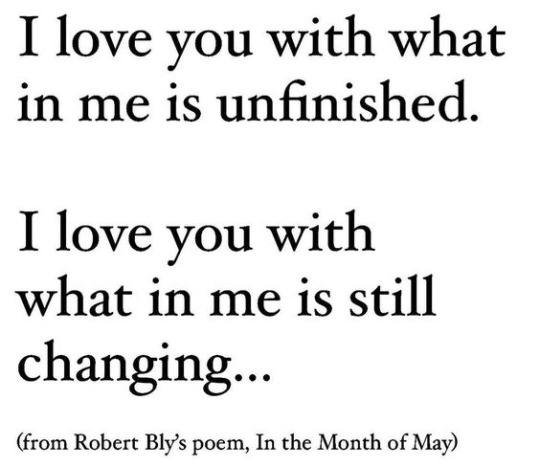
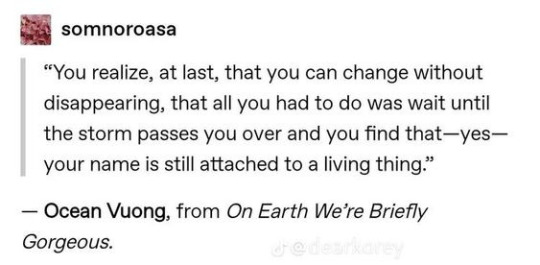
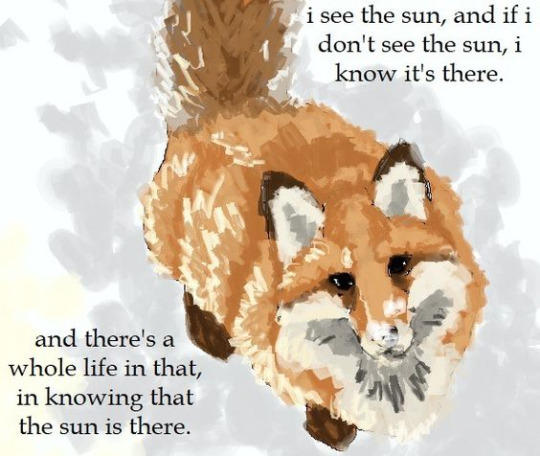
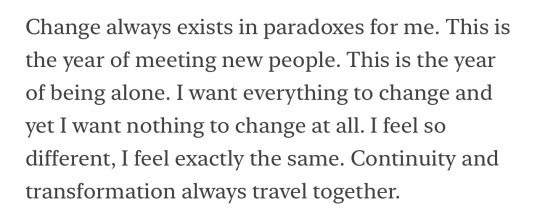
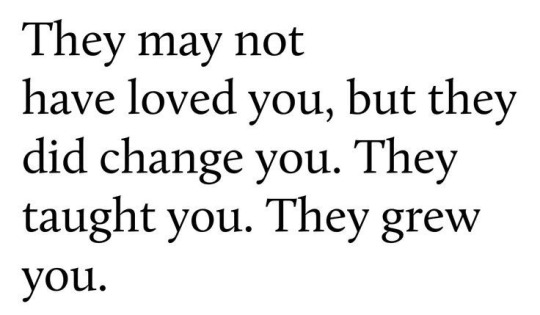

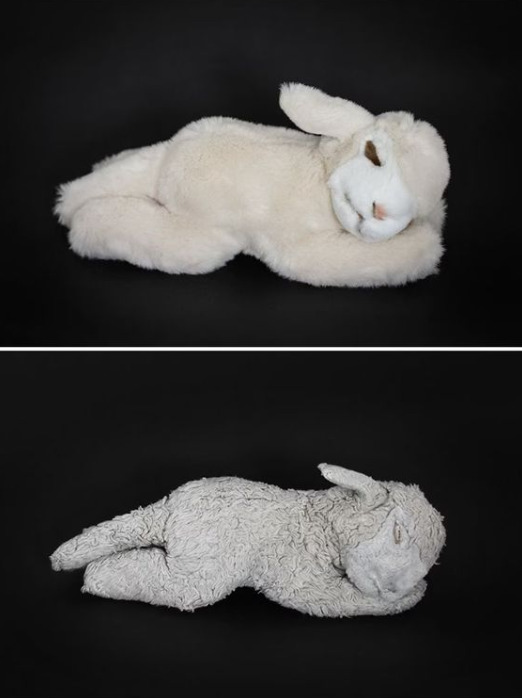

to be loved is to be changed
Haruki Murakami South of the Border, West of the Sun // Robert Bly In the Month of May // Ocean Vuong On Earth We're Briefly Gorgeous // art: unknown quote: Fyodor Dostoeyevsky The Brothers Karamazov // @x2s (via @llovelymoonn) // Bianca Sparacino // Noah Kahan You're Gonna Go Far // Katja Kemnitz Too Much Love // Charlotte Eriksson Everything Changed When I Forgave Myself
#based on that garfield meme and the tiktok trend#on change#on self#on love#poetry parallels#web weave#haruki murakami#south of the border west of the sun#robert bly#in the month of may#ocean vuong#on earth we're briefly gorgeous#fydor dostoevsky#the brothers karamazov#bianca sparcino#noah kahan#you're gonna go far#katja kemnitz#too much love#charlotte eriksson#everything changed when i forgave myself#poem#spilled poetry#spilled thoughts#spilled ink#dark academia#writing#words#poetry#dark academia poetry
5K notes
·
View notes
Text

Miguel Hernández, tr. by Robert Bly, from Selected Poems; “Before Hatred, Thirsting,”
504 notes
·
View notes
Text












SILVER AND MAX + SURVIVAL
one source of bad information, robert bly / the paris review - anne carson / the interesting narrative of the life of olaudah equiano, or gustavus vassa, the african / the living series, jenny holzer
#smtau#bs#black sails#webweaving#john silver#max black sails#max bs#silvermax#photo/vid/gif#jenny holzer#anne carson#robert bly
169 notes
·
View notes
Text
“To be wild is not to be crazy or psychotic. True wildness is a love of nature, a delight in silence, a voice free to say spontaneous things, and an exuberant curiosity in the face of the unknown.” ~Robert Bly
926 notes
·
View notes
Text
The joy of being alone, eating the honey of words.
Robert Bly, excerpt from "It's As If Someone Else Is With Me"
#book quotes#poetry quotes#poetry#Robert bly#literature#books and libraries#books and reading#solitude#reading
297 notes
·
View notes
Text
“It is not our job to remain whole.
We came to lose our leaves
Like the trees, and be born again,
Drawing up from the great roots.”
—Robert Bly
#poem#poetry#robert bly#it is not our job to remain whole#we came to lose our leaves and be born again
533 notes
·
View notes
Text

Robert Bly, from “A Mind Apart: Poems of Melancholy, Madness, and Addiction; ‘Depression’”, edited by Mark S. Bauer.
#Robert Bly#A Mind Apart: Poems of Melancholy Madness and Addiction#American Literature#Poetry#Quotes#Lit#Literature#Litblr
295 notes
·
View notes
Text
The Night Abraham Called to the Stars
by Robert Bly
Do you remember the night Abraham first saw The stars? He cried to Saturn: “You are my Lord!” How happy he was! When he saw the Dawn Star, He cried, “You are my Lord!” How destroyed he was When he watched them set. Friends, he is like us: We take as our Lord the stars that go down. We are faithful companions to the unfaithful stars. We are diggers, like badgers; we love to feel The dirt flying out from behind our back claws. And no one can convince us that mud is not Beautiful. It is our badger soul that thinks so. We are ready to spend the rest of our life Walking with muddy shoes in the wet fields. We resemble exiles in the kingdom of the serpent. We stand in the onion fields looking up at the night. My heart is a calm potato by day, and a weeping Abandoned woman by night. Friend, tell me what to do, Since I am a man in love with the setting stars.
125 notes
·
View notes
Note
Hi. Not sure if you've answered this before, but do you have a list of books to recommend on fairytale/mythic analysis?
So I finally have a real response to this question, but it's LONG, be warned:
First, it depends what you want to get out of your folklore study, what lens you'd like to use for analysis. And second, it's important to know that the practice of folktale analysis has changed over time, especially in the last ~15 years or so as the scholarly consensus has evolved toward decolonization.
For example, the common historical starting place was Bruno Bettleheim's The Uses of Enchantment. Candidly, I haven't read it yet for a few reasons: 1) It focuses fairly exclusively on Western European fairy tales like those of Grimm, Basile, and Perrault. 2) It assumes the primary audience for such tales are children. 3) It's a white man's perspective, and there are already enough of those to go around. That said, it's considered a foundational text for folklore study, so I'll probably get to it eventually. There are some modern authors who might be considered scholarly successors of Bettleheim, like Maria Tatar. I haven't read her books yet but I know she's also a powerhouse of Western fairy tale analysis.
Some other popular perspectives include the works of Carl Jung and his protégés in psychoanalysis, Marie-Louise von Franz and Erich Neumann. These are wonderful sources for learning about depth psychology and the universal unconscious which causes certain motifs to recur in storytelling across the globe and over centuries. Another popular author in this field is Robert Bly, who dove deeply into the concept of the Shadow as it appears in folk tales.
But for me, my favorite sources have been a collection of feminist authors who were active in the late 80s and early 90s, notably Barbara Fass Leavy and the incomparable Clarissa Pinkola Estes. While their work is pretty firmly grounded in second-wave feminism and therefore not very intersectional as we understand it today, they were the first to begin exploring interpretations of folk tales outside of a patriarchal context. I personally refer to Leavy's In Search of the Swan Maiden and Estes' Women Who Run With the Wolves more than any other books.
A lot of the most current perspectives are only accessible via blogs, like Jeana Jorgensen AKA The Foxy Folklorist, who often explores fairy tales through a Queer lens. Another brilliant voice working today is Helen Nde of Mythological Africans, who is doing the long-overdue work of decolonizing African folklore.
And while all these sources will help you develop a framework for analysis, still one of the best things you can do is read the tales for yourself. One of my favorite series is that of Heidi Anne Heiner of Sur La Lune Fairy Tales, who has amassed impressive collections of folk tales of the same type from around the world, making comparison easy. She also provides excellent footnotes that offer context to the versions and translations she's selected, and every tale has a source.
Outside of that, I like to read regional collections from indigenous scholars and native speakers: some editors will even include a copy in the original language along with the English translation, thus allowing others to "check their work." One of my favorite folkorists like this is Inea Bushnaq, who collects Arab folktales and again provides accessible cultural context. It's important to remember that most oral folktales which are now available in English were first recorded by colonizers, so the versions we have may be edited, mistranslated, or even maliciously altered to suit Western tastes. This is why seeking out versions from actual members of indigenous communities is critical.
Right now, I'm reading The Japanese Psyche: Major Motifs in the Fairy Tales of Japan by Hayao Kawai, and I'm next going to try Oral World and Written Word by Susan Niditch. I tend to just go where the spirit moves me, journal a bit, go down a research rabbit hole about a particular topic... it's fun. But whatever you're looking to get out of your folk tale study, rest assured you will never run out of material!
#folklore#folk tales#fairy tales#mythology#bruno bettleheim#maria tatar#carl jung#marie louise von franz#erich neumann#robert bly#clarissa pinkola estes#barbara fass leavy#jeana jorgensen#foxy folklorist#helen nde#mythological africans#african folklore#inea bushnaq#arab folklore#japanese folklore#depth psychology#comparative mythology#jungian shadow#jungian psychology#sur la lune fairy tales#heidi anne heiner#brothers grimm#charles perrault#giambattista basile#asks
31 notes
·
View notes
Text
WHEN MY DEAD FATHER CALLED
Last night I dreamt my father called to us.
He was stuck somewhere. It took us
A long time to dress, I don't know why.
The night was snowy; there were long black roads.
Finally, we reached the little town, Bellingham.
There he stood, by a streetlamp in cold wind,
Snow blowing along the sidewalk. I noticed
The uneven sort of shoes that men wore
In the early Forties. And overalls. He was smoking.
Why did it take us so long to get going? Perhaps
He left us somewhere once, or did I simply
Forget he was alone in winter in some town?
ROBERT BLY
73 notes
·
View notes
Text
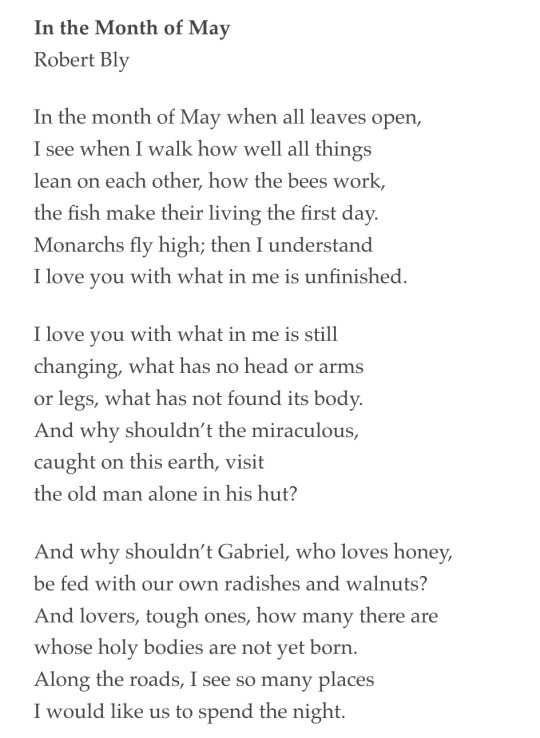
in the month of May by Robert Bly
403 notes
·
View notes
Text
Absence knifes open my heart.
— Mirabai, Mirabai: Ecstatic Poems, transl by Robert Bly & Jane Hirshfield, (2004)
80 notes
·
View notes
Text

Miguel Hernández, tr. by Robert Bly, from The Selected Poems; "Eternal Darkness,"
764 notes
·
View notes